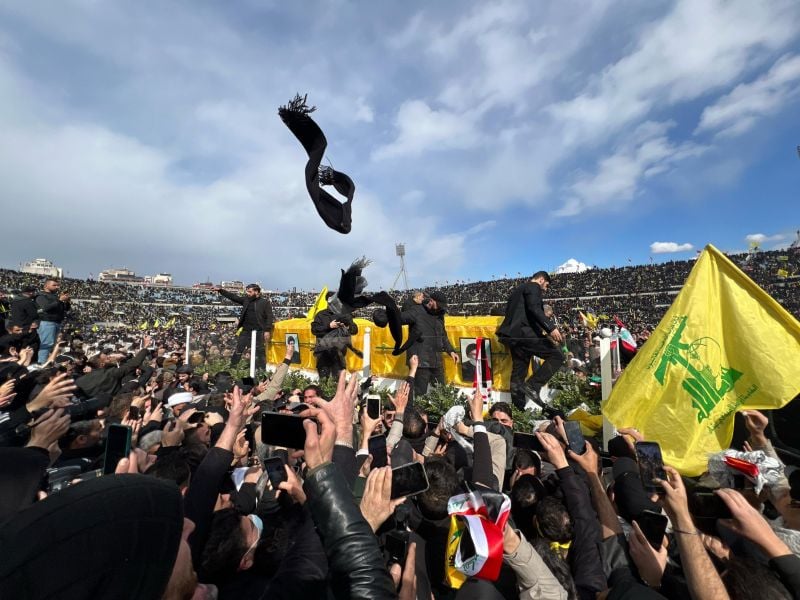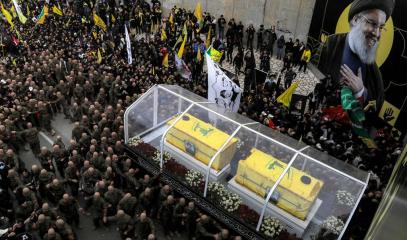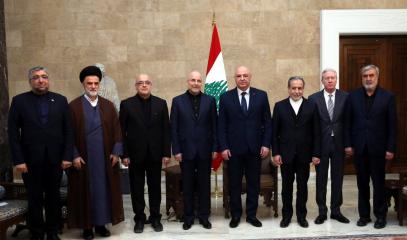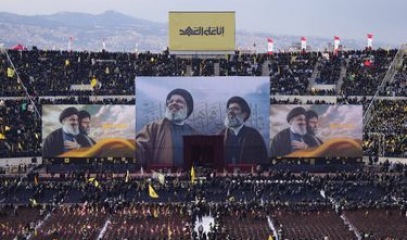Nasrallah's funeral and Hezbollah's uncertain future, between politics and armed resistance
Despite the huge turnout and the high-level Iranian representation, the funeral of the two leaders of the Party of God was not the show of force that many had hoped for. On two occasions, four Israeli fighter planes flew over Beirut. The Christian, Sunni and Druze political leadership stayed away from the ceremony. Aoun to Tehran: ‘Lebanon is tired of other countries’ wars on its territory’.
Beirut (AsiaNews) - Despite the bitter cold and clear blue skies, several hundred thousand Hezbollah supporters and affiliates poured in from different parts of the country to the sports city in Beirut yesterday morning for the funeral of Hassan Nasrallah. The secretary general of the Party of God was killed in an Israeli air raid on 27 September last year, while a week later it was the turn of his heir apparent, Hashem Safieddine, who was also shot dead by Israeli fighter planes displaying the Star of David.
To avoid clogging up the streets and blocking the traffic, parking areas were set up a long way from the ceremony. The crowd, who had arrived on foot, was so large that the stadium was full three hours before the funeral was due to begin. The service was characterised by the recital of verses from the Koran and laments for the man his supporters consider to be ‘a new Hussein’, followed by a speech by the new secretary general of the party, Naïm Qassem.
After his speech, a lorry carrying the coffins of the two leaders slowly made its way around the stadium through the crowd, with mourners sitting on the lorry bed, rubbing the clothes that had been thrown at them against the coffin covered with a yellow flag, and then returning them to the crowd. For security reasons, air traffic at the airport was suspended between midday and 4pm, and the use of automatic weapons was also prohibited.
Disappointing turnout
Iran was, of course, the country most present at the ceremony. The Tehran regime was represented by the Speaker of the Parliament, Mohammad-Bagher Ghalibaf, and the Minister of Foreign Affairs, Abbas Araghchi, as well as by delegations made up of high-level religious, political and military figures. Representatives of pro-Iranian factions from Iraq, Yemen, Turkey, Bahrain and the Sultanate of Oman were also present.
The President of the Republic Joseph Aoun and the Prime Minister Nawaf Salam did not attend the ceremony, but sent ‘representatives’ in their place: the former was the President of the Parliament, Nabih Berry, and the latter the Minister of Labour, Mohammad Haidar. In accordance with Lebanese mourning customs, the head of the Maronite Church, Cardinal Beshara Raï, was represented at the funeral by the Archbishop of Saïda, Monsignor Maroun Ammar. The cardinal did not escape criticism for this decision.
In terms of Lebanese political leadership, Sunni, Christian and Druze representation was rather low at Nasrallah's funeral, certainly not up to the expectations of the current leaders of Hezbollah. Apart from Sleiman Frangié, the Party of God's candidate for the presidency, and Talal Arslan, no leader of the main Christian factions was present at the ceremony.
Qassem's ambiguity, Israeli threat
For security reasons, the new Hezbollah secretary general Naïm Qassem did not attend the funeral ceremony. His speech was broadcast live, but from a safe location. Reliable sources, interviewed by AsiaNews, assure that ‘it was not pre-recorded’.
As for the content, Qassem remained ambiguous, stirring up winds of war and using a conciliatory tone at the same time. The secretary general of Hezbollah stated that ‘Lebanese officials are well aware of the internal balances’ and made it clear that he will not tolerate his party being marginalised from power. ‘Lebanon is a definitive homeland and we are Lebanese’, added the Shiite leader, quoting the Taif Agreement, which provides for the dissolution of all militias.
‘The resistance’ against Israel “is not over”, he insisted, before warning that his party will not accept the United States “controlling Lebanon”. “We remain faithful to our oath, Nasrallah! We will continue on the same path even if we have to sacrifice our lives and our homes”, he continued, stating that “the resistance will continue from generation to generation”.
According to analysts, he was trying to speak to two divergent currents within Hezbollah: the pro-Iranian party is now divided between a hardline and extremist wing that wants to continue the military effort, and a conciliatory wing that wants to politically exploit the popularity shown yesterday in all its scope, in view of the legislative elections of 2026.
At the same time, the Israeli reaction to the funeral was particularly strong. Four Israeli planes flew over Beirut twice during the funeral. This gave observers the impression that the service could not have taken place without Israel's tacit agreement, something that Hezbollah denied. Commenting on the flyover of Beirut, the Israeli Defence Minister, Israel Katz, stated in a press release that the planes ‘send a clear message: whoever attacks or threatens to destroy Israel, will meet the same end’.
Aoun: courteous, scathing
‘Lebanon is exhausted by other countries‘ wars on its own territory’, President Joseph Aoun had to declare in a courteous but scathing manner to the Speaker of Parliament, the head of diplomacy and the Iranian ambassador to Beirut, who were received at the Baabda presidential palace after the ceremony. In response to Ghalibaf's statement that Tehran supports ‘Lebanon's sovereign decisions, without any external interference’, Aoun replied that he shared this vision of ‘non-interference of one country in the affairs of another’. The president then added that ‘Lebanon is exhausted by other countries’ wars on its own territory. No country should interfere in the internal affairs of another’.
In support of his remarks, the Lebanese head of state cited Article 9 of the Iranian Constitution, which states that “the freedom, independence, unity and territorial integrity of a country are indivisible”. Finally, Hezbollah supporters clashed with the Lebanese army and vandalised a UNIFIL convoy a week before the funeral, due to the decision to suspend flights to Beirut by Mahan Air, an Iranian airline. Israel had previously accused it of transporting money to be delivered to Hezbollah and had threatened to bomb the airport if the flights continued.










.png)










